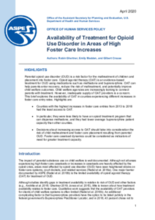Parental opioid use disorder (OUD) is a risk factor for the maltreatment of children and placement into foster care. Opioid agonist therapy (OAT) is an evidence-based treatment for OUD using medications such as methadone and buprenorphine. OAT can help parents enter recovery, reduce the risk of maltreatment, and potentially improve child welfare outcomes. Child welfare agencies are increasingly looking to connect parents with treatment. However, inadequate supply of OAT providers is a concern. This brief explores the availability of OAT in counties experiencing different increases in foster care entry rates. Highlights are:
- Counties with the highest increases in foster care entries from 2013 to 2018 had the least access to OAT.
- In particular, they were less likely to have an opioid treatment program that can dispense methadone, and they had lower average buprenorphine patient capacity than other counties.
- Decisions about increasing access to OAT should take into consideration the risk of child maltreatment and foster care placement resulting from parental OUD. Foster care caseload dynamics could be considered as indicators of need for greater treatment capacity

